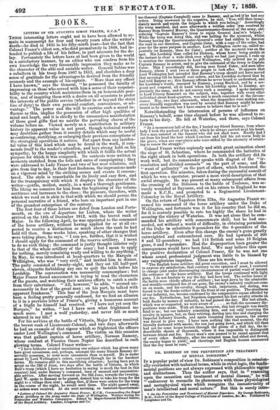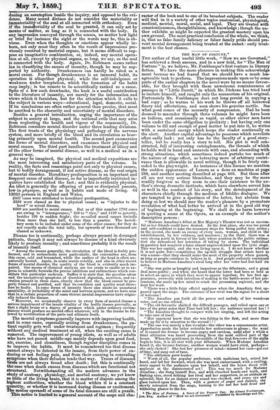DR. ROBINSON ON THE PREVENTION AND TREATMENT OF MENTAL DISORDERS. *
IN a popular point of view Dr. Robinson's composition is occasion- ally overladen with technical terms, while in strict logic, the funda- mental positions are not always expressed with philosophic -vigour and distinctness. Thus the author says, that in " reasoning upon the causation and treatment of mental disease," he will " endeavour to reconcile its phenomena with those physiological and metaphysical views which recognize the immateriality of man's intellectual and moral nature." But this is surely intro- • On the Prevention and Treatment of Mental Disorders. By George Robinson, M.D., Fellow of the Royal College of Physicians of London, &c. &c. Published by Longmans and Co. ducing an asstimption beside the inquiry, and opposed to the evi- dence. Many Sound divines do not consider the materiality or immaterialit7) of the soul at all connected with orthodoxy. Even if the immalteriality of the soul be granted, it can only act by means of matter, so long as it is connected with the body. In any impression conveyed through the senses, no matter how light or brief for instance the sight or the words may be, this is ob- vious. Even when the thoughts or emotions appear wholly in- born, not only must they often be the result of impressions pre- viously received by material organs, but it seems difficult to sup- pose an imaginative combination, or, indeed, any mental opera- tion at all, occept by physical organs, as long, we say, as the soul is connected *ith the body. Again, Dr. Robinson seems rather lax in classifying the causes of insanity, though he may be sup- ported by authority. Drunkenness can hardly be rated as a moral cans'. For though drunkenness is an immoral habit, its operation i altogether physical; while the self-indulgence or weakness nder temptation, which the formation of the habit may imply,: is too remote to be scientifically ranked as a cause. Spite of a few such drawbacks, the book is a useful contribution to the literature of insanity, not merely for the information and views which it furnishes, but for the attention which it calls to the subject in various ways—educational, legal, domestic, social. If its conclusions are often rather general than precise, that must be ascribed to the obscurity and uncertainty of mental disorders. Besides a general introduction, urging the importance of the subject to society at large, and the national evils that may arise from neglecting the health and vigour of the community, Dr. Robinson considers mental disorder under three leading divisions. The first treats of the physiology and pathology of the nervous system, and more briefly of the blood and its circulation as bear- ing primarily upon mental health. The second part enumerates the forms of mental disorders, and examines their physical and moral causes. The third parehandles the treatment of idiocy and i of the other forms of mental disease, as well in a medical as in a general way.
_ As may be imagined, the physical and medical expositions are the most interesting and satisfactory parts of the volume. In reality, the facts and reasonings point not only to physical causes, but to bodily derangement, if not active disease, as the real origin of mental disorder. Hereditary predisposition is an important and frequent cause of mind disease, so far as imperfectly instituted in- quiries have established the fact; and this is evidently physical. An idiot is generally the offspring of poor or dissipated parents, low in physique, as well as in habits and mode of living. Of 12033 persons in England and Wales,
2557 cases were attributed to hereditary predisposition,
3358 were classed as due to physical causes ; as "injuries to the head" or actual disease, 6609 are aieribed to moral causes. But as of this number 1792 eases are owing to "intemperance," 549 to "vice," " and 1129 to poverty, besides 199 to sudden fright ; the so-called moral causes dwindle from more than One half, to less than a quarter. The heredi- tary seem to be included under some of the other causes; for they do not exactly make the total tally, but upwards of two thousand are classed as unknown.
Disease too is continually, perhaps always present in deranged patients, though it may not always be disease of a kind obviously likely to produce insanity ; and sometimes probably it is the result of insanity itself.
" Among the insane generally, the circulation of the blood is feebly per- formed, and in melancholia more particularly, the extremities are, from this cause, cold and benumbed, while the surface of the bead is often un- naturally heated. Again, in acute mania notably, and also in other recent forms of mental disorder, the quality of the blood is evidently much im- paired. Our means of chemical analysis are too crude to enable us to ex- press in scientific formulae the precise additions and subtractions which con- stitute this particular cachexia. Suffice it to state that the peculiar odour and the unequivoml spmptoms of disordered digestion, secretion, and ex- cretion present in these cases, clearly show that the blood cannot be pro- perly formed and purified, and that its condition and quality must there- fore be faulty. In some forms of insanity there also exists an unnatural sensibility, or irritability of the mind and nervous system, and we have seen that in a certain proportion of cases violent mental impressions have origin- ally induced the disease.
" Moreover, we occasionally observe in every form of mental disease a serious impairment of the innate vitality of the bodily tissues generally, so that a slight bruise or a degree of pressure which under ordinary circum- stances would produce no morbid effect whatever, will in the insane be fol- lowed by mortification of the parts and ultimate death.
The mental symptoms generally improve with improving health, and in some cases, especially arising from drunkenness, the pa- tient rapidly gets well under treatment and regimen ; frequently without any medical treatment at all, when the exciting cause is removed. The improvement of young idiots, as well as of adults who have not passed middle-age mainly depends upon good food, air, exercise, and cleanliness, though regular discipline comes in
improve mprove the habits. It must be remembered too that disease cannot always be detected in the insane, from their power of en- during or not feeling pain, and from their cunning in concealing symptoms when their delusion tends that way. Traces of diseased brain are not always found after death ; but this is continually the ease when death ensues from diseases which are functional not structural. Notwithstanding all the modern advances in the study of anatomy, physiology, and morbid anatomy, we yet know so little of the living brain, that it is matter of dispute among the highest authorities, whether the blood within it is a constant uantity, or whether it is increased during disease or excitement The modus operandi of some of its fatal diseases are still a Finagle.
This notice is limited to &general account of the scope and cha-
meter of the book and to one of its broadest subjects. The reader will find in it a variety of other topics anatomical, physiological, medical, mental, moral, social, and legal. They are treated with conscientiousness, thoughtfulness, and knowledge ; though the au- thor exhibits as might be expected the greatest mastery upon his own ground. The most practical conclusion of the whole, we think, le, that no false family delicacy or falser family pride should pre- vent mental derangement being treated at the outset : early treat- ment is the best chance.



























 Previous page
Previous page